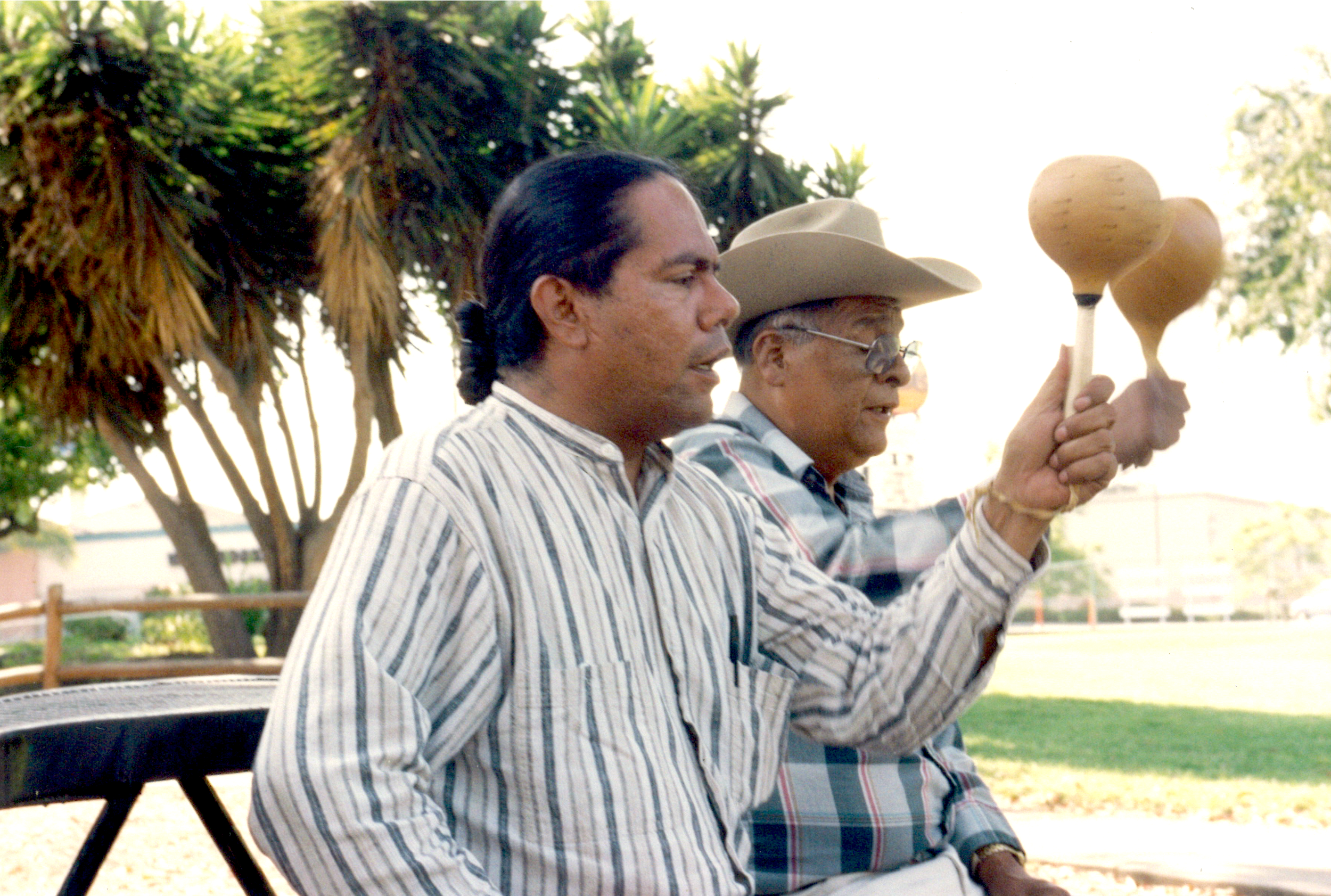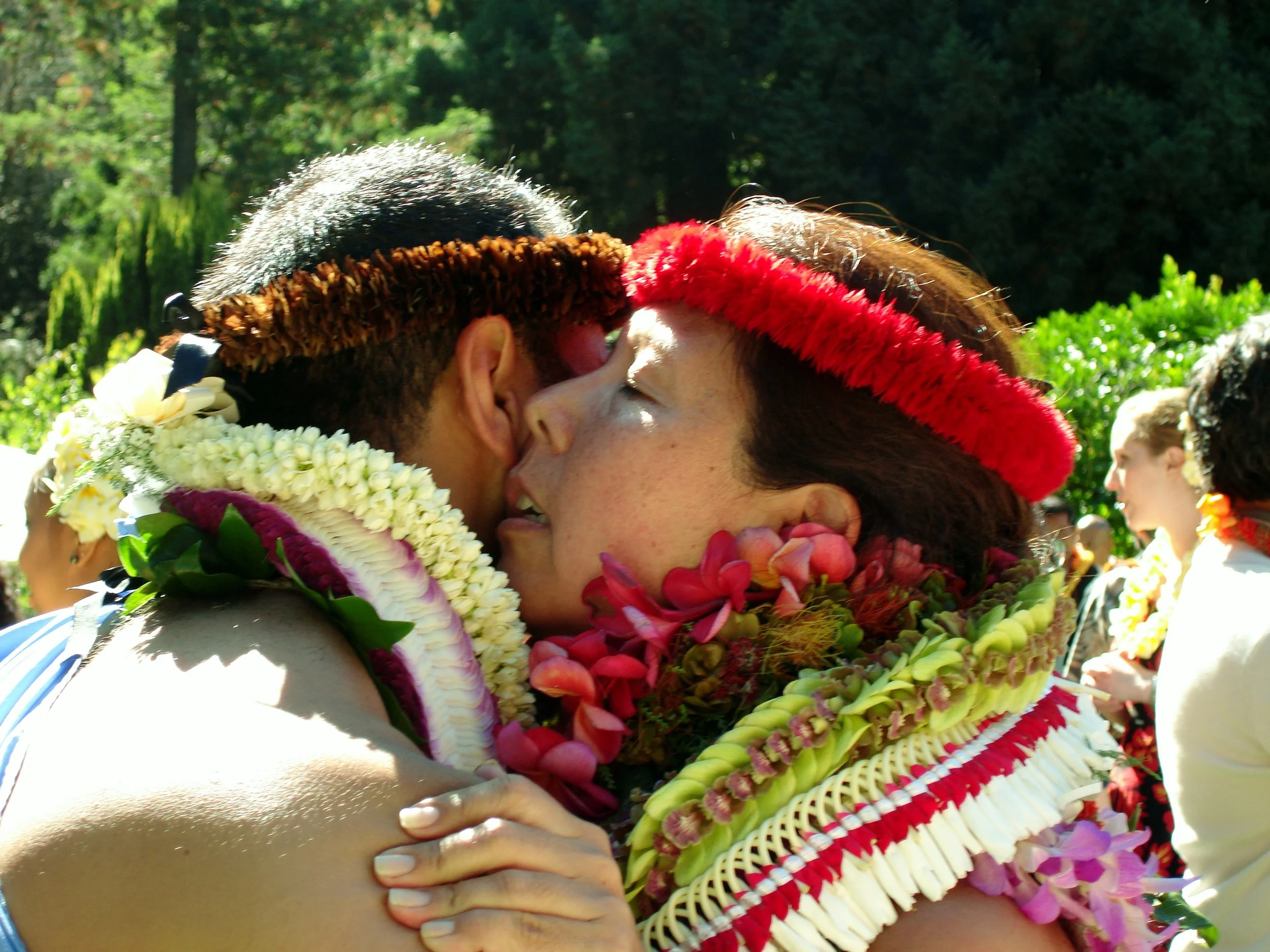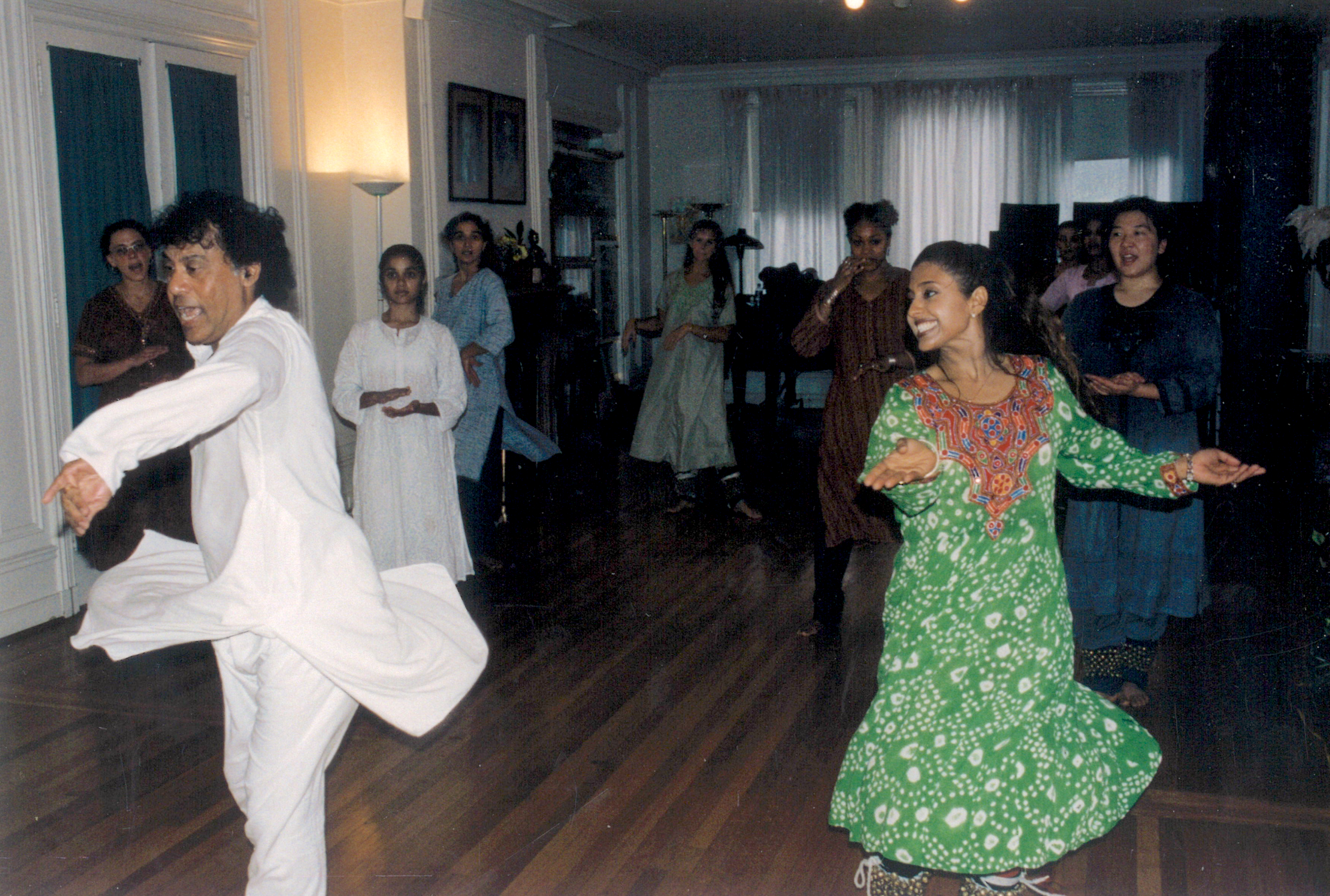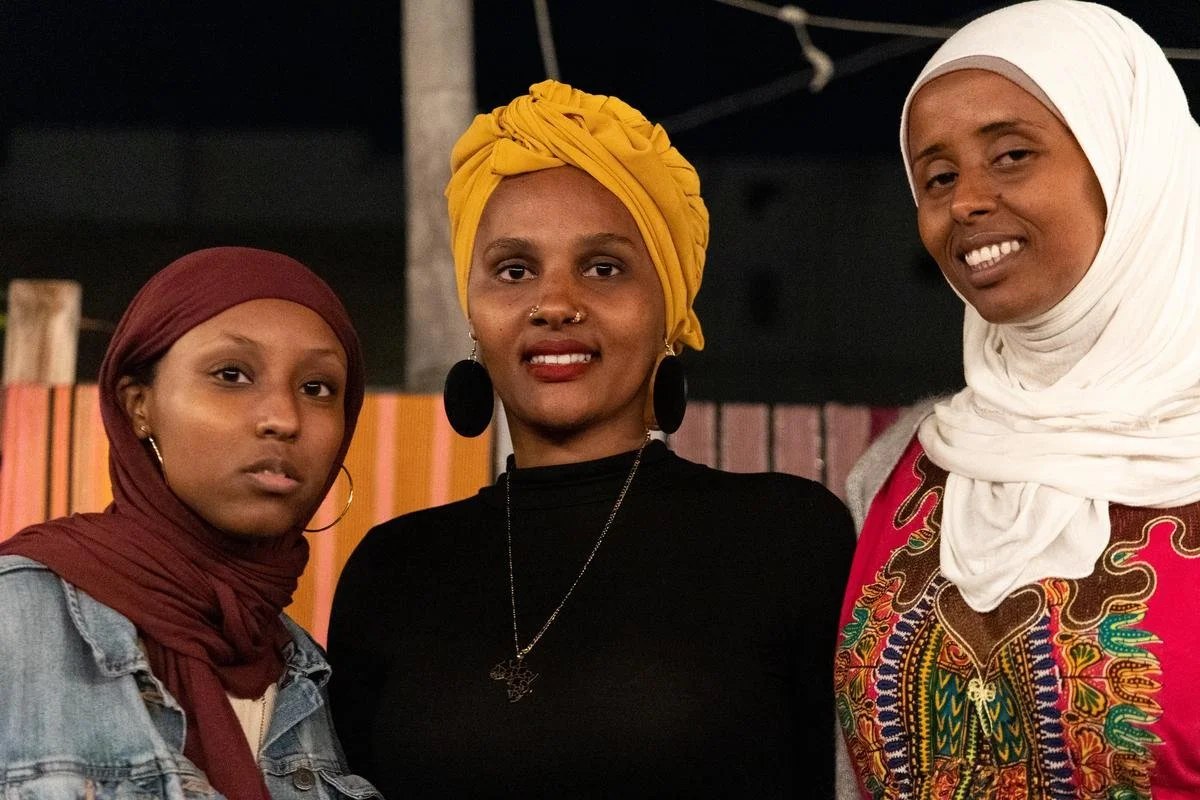Sustaining Cultural Practice
For over 25 years, ACTA has been a steward and advocate of cultural heritage. By supporting the diverse cultural communities of urban and rural California, ACTA ensures that the stories and practices of its communities endure for generations to come. These practices include the intricacies of Ohlone basketry, the revitalization of dormant language through Hawaiian hula and chant, Somali cooking, Mexican brass band, and Western saddle making. ACTA provides critical monetary and technical support, visibility, and connection to others, ensuring that voices often marginalized are uplifted and celebrated.
About the images featured in this timeline.
“The power of mentorship: Apprenticeship Program launches
ACTA launches its flagship Apprenticeship Program pairing master-lever artists with passionate apprentices through mentorship experiences. Contracts of $3,000 support master artists and apprentices in honing their skills and knowledge through the time-honored and intimate process of one-on-one learning. Led by Project Director Amy Kitchener, this launch marks a pivotal milestone for traditional arts.
ACTA co-founders and regional partners David Roche (N. California) and Terry Liu (S. California), along with Amy Kitchener (Central California), show the deep reach into rural and urban communities throughout the state, fostering a sense of recognition and validation through their efforts. Today, ACTA has supported over 400 apprenticeship pairs, now with contracts of $5,000 each.Learn more about our Apprenticeship Program →
”
“Capacity-building funds for traditional artists and organizations
ACTA introduces the Traditional Arts Development Program, offering contracts tailored to the unique needs of traditional artists, unincorporated groups, and nonprofits. These contracts, providing up to $1,500, offered flexible funding for a broad range of needs including skill development for classes to acquire computer skills, travel stipends to conferences, consultancies with culture bearers, or consultations with attorneys to assist in filing for non-profit status. This flexible quick-response program is immensely popular, providing vital support for artists and grassroots organizations. ”
“Apprenticeship Spotlight: Danny Kalanduyan brings kulintang to the West
In 2000, the Bay Area kulintang musician Danongan ‘Danny’ Kalanduyan (1947–2016) serves as a mentor in our Apprenticeship Program. Earning our nation’s highest honor for traditional artists as a National Heritage Fellow from the National Endowment for the Arts, he is recognized for his pivotal role in introducing the music of the Muslim Philippines, known as kulintang, to the West. Danny’s tireless dedication to educating the Filipino diaspora community about indigenous musical roots remains a defining aspect of his career.
His influence extends to institutions like San Francisco State University’s Ethnic Studies Department, where he nurtured new generations of kulintang musicians and dancers. Danny inspires countless artists, including Bernard Elloran, Conrad Benedicto, and Titania Bucholdt, who continue to carry on his teachings and traditions. His impact on the Filipino-American community is evident in the resurgence of traditional practices and the emergence of new artistic directions, as reflected in community gatherings and artistic projects across California.
“Apprenticeship Spotlight: Recognizing the contributions of refugee artists Charya Cheam Burt and Sophilene Cheam Shapiro
Charya Cheam Burt, a respected artist in ACTA’s Apprenticeship and Living Cultures Programs, has played a key role in preserving and promoting Cambodian classical dance in California, the U.S., and internationally. She and her sister, Sophilene Cheam Shapiro, trained at the School of Fine Arts in Phnom Penh under renowned masters until they were forced to flee due to the targeting of artists by the Pol Pot regime. The loss of Khmer artists during the Cambodian genocide deeply impacted them, and they dedicated themselves to rebuilding this centuries-old dance form. Sophiline returned to Cambodia to revitalize the school closed by the war, while Charya continued teaching in the U.S.
Since relocating to the U.S. in 1993, Charya has mentored many apprentices, including Prumsodun Ok and Ryan Boun, who are now leaders and culture bearers in their communities. Both Charya and Sophiline served as mentors in ACTA’s Apprenticeship Program, in 2001 and 2000, respectively. Since then, Charya has expanded her teaching to rural areas and urban centers, providing crucial cultural knowledge to the next generation of Cambodian Americans.Watch a KQED interview with Charya Burt →
”
“Apprenticeship Spotlight: Native California’s Stanley Rodriguez preserves Kumeyaay Wildcat songs
In 2001, educator, language teacher, and tribal singer Stanley Rodriguez, Ed.D (Kumeyaay Santa Ysabel Band of the Iipay Nation) becomes one of the first participants in ACTA’s Apprenticeship Program. Stanley embarks on a journey to preserve the endangered Wildcat ceremonial songs of the Kumeyaay. Mentored by the late Jon Meza Cuero, the last elder with knowledge of this song cycle, Stanley continues to hold and share this practice and work tirelessly for language retention and cultural preservation. He draws upon teachings from his grandmother and other Kumeyaay elders to impart traditional knowledge and culture through his work. Stanley is on the board of Advocates for Indigenous California Language Survival and has been teaching Kumeyaay language classes since 2000, welcoming Native and non-Native students alike to engage with Kumeyaay culture and ensuring the legacy of his culture endures.Watch Stanley Rodriguez perform at the grand opening of ACTA’s Southern California office →
”
“ACTA expands our grantmaking portfolio, increasing our impact
Recognizing the crucial role of traditional arts practices, The Walter & Elise Haas Fund collaborates with ACTA to launch the Bay Area Folk and Traditional Arts Mentorship Program. In its inaugural year, twelve organizations each receive $10,000, planting the seeds for what will become the statewide Living Cultures Grant Program. Through this initiative, ACTA emerges as an invisible weaver, skillfully intertwining the threads of foundation support and traditional arts expertise. This pivotal role not only allows foundations to confidently fund smaller, impactful projects but also sets a lasting precedent for ACTA’s future as a trusted intermediary in the cultural sector.”
“Apprenticeship Spotlight: Chicana altarista Ofelia Esparza transmits traditions of continuity and innovation
In 2002, Chicana altarista Ofelia Esparza shares the tradition of the Mexican ofrenda, or altar-making, with her daughter Elena through ACTA’s Apprenticeship Program. A sixth-generation altarista, Ofelia played a pivotal role in shaping the landscape of Chicano arts in Southern California during the ‘70s and ‘80s. She pioneered bilingual education in LA schools, imparted her deep knowledge of medicinal plants, and earned recognition for her elaborate nacimientos (nativity scenes). Collaborating closely with organizations like Self Help Graphics, she not only brought the tradition of making Day of the Dead altars to Southern California but also widened the practice of altar-making, nurturing a sense of community and identity within the Chicano movement. Her family now creates the official Day of the Dead altar at L.A.’s Grand Park.
In 2018, Ofelia receives the nation’s highest honor for folk and traditional artists, the National Heritage Fellowship from the National Endowment for the Arts, for her altar-making. Ofelia goes on to participate in the Apprenticeship Program with her daughters Rosanna Esparza Ahrens in 2012 and Denise Esparza in 2022. Today, alongside her daughters, Ofelia continues to carry the torch of Chicano artistry, teaching and sharing their craft in institutions and communities across the region, including at their gallery, Tonalli Studio in East Los Angeles.Learn more about Ofelia Esparza →
”
“Supporting organizations through the Living Cultures Grant
In 2005, the Fund for Folk Culture passes the torch to ACTA to administer the CTAAP (California Traditional Arts Advancement Program) funded by the James Irvine Foundation and the William and Flora Hewlett Foundation. We rebrand as the Living Cultures Grant Program, and the Walter & Elise Haas Fund joins as a funding partner. First headed by dance ethnologist Lily Kharrazi, who ran the program for 15 years, Living Cultures offers vital support to grassroots cultural endeavors, making small grants to organizations and unincorporated groups that typically fly beneath the radar of arts funding. What we develop through this program is a model of making grants accessible—one of ACTA’s core values—serving as a gateway for many artists and organizations to leverage funding opportunities.”
“Living Cultures Spotlight: Nā Lei Hulu I Ka Wēkiu prepares an ‘ūniki ceremony
In 2006, the Living Cultures grant supports an ’ūniki’ ceremony: a rigorous study for hula dancers in the protocols of language, chant, ritual, dance and implement making. These students can then become Kumu or master teachers.
Nā Lei Hulu I Ka Wēkiu (meaning “the many-feathered wreaths at the summit, held in high esteem”) is the name of a Hula community led by Kumu Hula Patrick Makuakāne. The San Francisco-based hula school, established in 1985, is a beacon of Hawaiian cultural preservation and innovation, blending ancient traditions with contemporary interpretations. Makuakāne’s groundbreaking style, hula mua (“hula that evolves”), merges traditional movements with modern music and staging, challenging stereotypes while expounding on struggles faced by Native Hawaiians. In 2023, he is recognized as the first Native Hawaiian to receive a MacArthur Fellowship in the discipline of dance.Watch a video from Patrick about Māhū: Transgender Healers of Hawai’i →
”
“Living Cultures Spotlight: Long Beach’s Hmong community intervenes with Qeej Not Gangs
The Hmong Association of Long Beach stands as a beacon of how traditional arts can enhance community well-being. Responding to the impacts of trauma, immigration, and acculturation faced by those fleeing war-torn Laos, the Hmong Association of Long Beach, Inc. launched Qeej (pronounced ‘gheng’) Not Gangs with the support of a 2009 Living Cultures grant. This program uses culture to counter gang activity threatening youth in the Hmong community. Each Sunday at the Homeland Community Center, an intergenerational group of community members can be found gathering and sharing time together. In addition to meals and stories shared, cultural practices are taught: men (and now women) learn to play the instrument known as qeej; women engage in paj ntaub (reverse appliqué embroidery); children learn dance and drumming. To this day, Qeej Not Gangs not only preserves Hmong traditions disrupted by war and resettlement but also fosters a sense of belonging and pride among participants.Read about the Hmong Association of Long Beach’s paj ntaub practice →
”
“The Community Leadership Project solidifies our commitment to the Central Valley
“To me, leadership has to do with responsibility and being responsible to the community, and giving back… giving to the community.
— Agustín Lira, Teatro de la Tierra
With the backing of the Packard, Irvine, and Hewlett Foundations, ACTA launches the Community Leadership Project, channeling $1 million in multi-year grants to 11 organizations in the under-resourced San Joaquin Valley. Targeting low-income communities of color, this initiative aims to enhance financial stability and foster leadership development. Over seven transformative years, these organizations receive operational grants, development support, and engage in a vibrant learning community dedicated to sustaining cultural work. Participants in the project testify to the profound dedication of the artists and cultural practitioners, who continually create transformative spaces for their communities. They feel deeply recognized and validated by the initiative’s seven-year investment, witnessing firsthand the powerful impact of sustained support.Read the CLP Ethnography by Debora Kodish →
”
“Living Cultures Spotlight: Indigenous Mexican communities come together in Monterey and Kern Counties
The Living Cultures Grant Program has been instrumental in recognizing and supporting Mexican indigenous practices in California. These communities, a major labor force in the state’s agriculture, bring with them their rich indigenous languages and art forms.
In Taft, individuals from San Pablo Tijaltepec, Oaxaca, began settling in 1999 and formed the Migrantes Mixtecos San Pablo Tjaltepec committee in 2000. This committee aims to preserve their hometown traditions amidst the challenges of migration and cultural adaptation. With a grant from ACTA in 2013, they offer classes in traditional embroidery and weaving techniques, passing down skills from elders to youth and adults.
Similarly, Movimiento Cultural de la Union Indígena (MCUI) in Greenfield, founded by Triqui immigrants from Oaxaca in 2005, receives support from ACTA in 2011 for their Triqui Dreaming project. This initiative focuses on weaving and music workshops, engaging 30 youth in reconnecting with their cultural heritage.
These projects highlight the diversity and resilience of Mexican indigenous communities in California and underscore the importance of preserving their rich traditions despite the challenges of migration and acculturation. These projects also underscore a commitment by ACTA to provide language appropriate resources to non-English speakers.”
“Living Cultures Spotlight: The Omnira Institute blends social justice and spirituality
The Omnira Institute’s mission is to connect African Americans to their African heritage. Co-directors Wanda Ravernell and Tobaji Stewart bring unwavering dedication to this mission, bringing light to Lukumí and Ifa spiritual traditions from West Africa and leveraging ACTA resources to amplify their impact. Supported by multiple Living Cultures grants since 2011, their flagship project, Roots of Faith, Roots of Freedom, fosters healing and resilience within Oakland’s African American community. This project honors the history of slavery and emancipation through observances, school presentations, and celebrations such as Juneteenth and the Black-Eyed Peas Festival.
The Omnira Institute offers healing ceremonies at the sites of police violence: using drums, Yoruba-based liturgies, and altars, they provide solace and support to grieving communities. The profound impact of these actions leads to repeated invitations to conduct these ceremonies, underscoring the enduring need for healing and solidarity. In 2018, Wanda and Tobaji join ACTA’s Arts in Corrections program as teaching artists, going on to teach at Deuel Vocational Institution and California Health Care Facility.”
“Apprenticeship Spotlight: Chitresh Das brings South Asian traditional dance to the diaspora
Pandit Chitresh Das (1944-2015) was a pivotal figure in bringing Kathak, one of the major classical dance forms of India to the West, leaving an indelible mark on California’s cultural landscape. In 1971, he arrived at the University of Maryland on a Whitney Fellowship to teach Kathak, and shortly after at the invitation of Ustad Ali Akbar Khan arrived in California. Das’s legacy took root in San Francisco, where he established the Chhandam School of Kathak Dance in 1980, now one of the largest Indian classical dance schools in North America.
He participates as a mentor in ACTA’s Apprenticeship Program four times, in 2013, 2009, 2007, and 2000, with apprentices Rachna Nivas, Jaiwanti Das Pamnani, Farah Yasmeen Shaikh, and Rina Mehta, respectively. He passed on the intricacies of Kathak to apprentices who would carry on his legacy. Das’s approach to Kathak is both innovative and deeply rooted in tradition, blending athleticism with storytelling. In 2009, Das is honored as a National Heritage Fellow by the National Endowment for the Arts, recognizing his contributions to the preservation and evolution of Kathak. His passing in 2015 marks the end of an era, but his legacy lives on through the countless students and disciples who continue to spread the art of Kathak around the globe.→ Read “In Memoriam: Pandit Chitresh Das”
”
“Apprenticeship Spotlight: Global ambassador Eduardo Martinez preserves Afro-Colombian drumming
Engaging Tradition: Afro-Colombian Music and Dance, Our Legacy
Immersed in Cartagena’s vibrant cultural milieu, Eduardo Martínez Arvilla learned the intricate rhythms and melodies of his Afro-Colombian heritage from a young age, studying with esteemed masters like Paulino Salgado and Encarnación Tovar. After formal music studies in Cartagena, Eduardo embarked on a journey as a workshop leader and global ambassador for Colombian culture, touring with renowned groups like Totó La Momposina.
In 2014 and 2016, Eduardo, now a resident of Los Angeles, serves as a mentor artist in ACTA’s Apprenticeship Program, passing on his knowledge to apprentice Alberto López, who grew up in Medellín. Together, they delve into the diverse rhythms of Colombia’s Caribbean coast, from cumbia to puya, preserving traditions at risk of fading. Alberto and Eduardo collaborate to record musical methodologies and perform live with different groups, such as the Justo Almario Afro Colombian Jazz Ensemble.”
“Living Cultures Spotlight: Burmese refugees find community in San Diego
The Karen Organization of San Diego (KOSD) is dedicated to supporting ethnic minority groups from Burma, fostering their educational and social development. Since 2000, the United States has resettled close to 200,000 refugees from Burma, including the Karen (pronounced kah-ren) people, with San Diego welcoming over 2,000 refugees to date.
In 2014 and 2016, KOSD receives vital support from ACTA’s Living Cultures grant, enabling arts programs including a weekly dance circle for youth, and back-strap weaving classes for older women. These programs provide refugees with more than just a venue for artistic expression; they offer a sanctuary where young people and elders navigate the challenges of resettlement in a supportive environment.Read about our site visit with KOSD →
”
“Apprenticeship Spotlight: Marion Coleman teaches African-American quilting
Bay Area quilter Marion Coleman (1946–2019) spent over three decades intertwining her social services work in youth and family services with her profound artistry in quiltmaking. Her quilts, celebrated both nationally and internationally, delve into themes of memory, social change, and community. Trained in quilt-making by her great aunts and great-grandmother, Marion engages with the art form to portray moments and histories from the African American experience, including shared stories of aging, of jazz and blues traditions, of black cowboys, and the first African American woman pilot.
In 2015, Marion’s wealth of knowledge and passion for African American quilting traditions finds a new apprentice in Ora Clay, through ACTA’s Apprenticeship Program. Marion is honored with the NEA’s National Heritage Fellowship in 2018, one year before her passing. In 2022, her former apprentice Ora passes on the art form to her daughter Niambi Clay as a mentor artist in our Apprenticeship Program, coming full circle and keeping Marion’s quilting legacy alive.”
“Living Cultures Spotlight: San Diego’s East African community celebrates cultural heritage
With over 10,000 Somali refugees resettling in San Diego, the Somali Community of San Diego receives a Living Cultures grant in 2021 to safeguard Gabay poetry, a traditional Somali oral poetry practice. This grant serves as a vital link between generations, preserving oral traditions and cultural heritage amid the challenges of diaspora and resettlement.
ACTA’s support to the Somali community began in 2007 with the Buraanbur Conference, organized by the Center for Bridging Communities to encourage the oral poetry tradition. In 2014, ACTA further supports the United Women of East Africa Support Team (UWEAST), established to address the overlooked health needs of their community. Through ACTA’s backing, an intergenerational cooking project is launched, fostering cultural exchange and promoting healthy eating habits among young Somali, Ethiopian, and Eritrean women. Mothers and daughters come together to share and learn culinary traditions from East Africa and America, crafting nutritious meals to combat the rise of chronic diseases within their community.Through these initiatives, ACTA continues to support East African communities as they address the acute stressors of resettlement and celebrate their rich cultural identity.”
“Sankofa Fund for Cultural Preservation launches
In 2021, ACTA launches the Sankofa Fund for Cultural Preservation, providing grants ranging from $1,500 to $15,000 to support San Francisco-based artists and organizations. Administered by ACTA through San Francisco Arts Commission funding, these one-year grants foster artistic expression in historically marginalized communities, distributing a total of $180,000. As a trusted intermediary in the sector, ACTA continues its mission to build racial equity through pandemic-era funding initiatives.”
“Stewarding the largest commissions in folk and traditional arts in the country
Recognizing the field’s vast potential, the William and Flora Hewlett Foundation commissions exceptional new works in the folk and traditional arts with $150,000 awards, totaling a $1.5 million investment. These commissions, the largest dollar amounts to date, enable ten Bay Area nonprofits to collaborate with lead artists from around the world. ACTA serves as the program consultant, conducting a field study on Bay Area traditional arts practices and managing the entire grants process, from application design to panel review.
In support of the Hewlett 50 Commissions in Folk & Traditional Arts, ACTA authors “Communities of Change: Traditional Arts as Enduring Social Practice in California’s Bay Area” – a survey of Bay Area practices and the unique ecosystem of cultural and historic support for these practices to flourish among First Peoples, immigrants, refugees, and next-generation practitioners.’Read ‘Communities of Change’ →
”
“The Living Cultures Grant scales up
After 17 years of successful field building and grant-making to folk and traditional arts practices in the state, an unprecedented $850,000 is distributed to the field by longtime funders: the California Arts Council, Walter & Elise Haas Fund, and the William and Flora Hewlett Foundation. This significant influx of funds acknowledges the vitality of California’s cultural practices and ACTA’s leadership in the field. We award 98 grants in 28 counties of the state through our Living Cultures Grant. With increased resources as well as a streamlined application process that recognizes both individual artists and organizations, our grant program sets a new standard of service for the sector.”
“Taproot Fellowship, ACTA’s new national fellowship honoring culture bearers launches
With Mellon Foundation’s backing, ACTA unveils the Taproot Fellowship from the new Taproot Artists & Community Trust program, a groundbreaking initiative aimed at bolstering support for U.S. culture bearers. Building on research that began in 2021, this fellowship offers $50,000 grants to 50 traditional artists and culture bearers over three years, enhancing cultural transmission and wellbeing. A national advisory group of 17 culture bearers helped shape the research behind the fellowship, with a report from the 18-month study published in 2022. The first cohort of recipients is announced in the summer of 2024.”
Timelines At-A-Glance



















